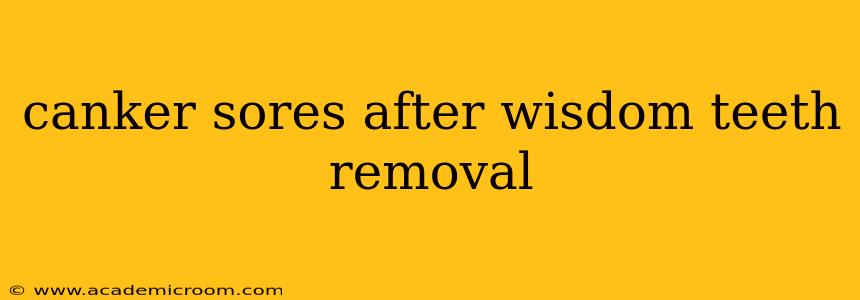Having your wisdom teeth removed is a significant oral surgery, and while most people focus on the expected pain and swelling, the appearance of canker sores afterward can be a surprising and unwelcome complication. This comprehensive guide explores the connection between wisdom teeth removal and canker sores, offering insights into their causes, prevention strategies, and effective treatment options.
Why Do I Have Canker Sores After Wisdom Teeth Removal?
The development of canker sores (also known as aphthous ulcers) after wisdom teeth removal isn't directly caused by the extraction itself, but rather by the ensuing trauma and changes within your mouth. Several factors contribute to their formation:
-
Trauma to the Mouth: The surgery itself can cause minor injuries to the soft tissues lining your mouth. This irritation can trigger the immune system response that leads to canker sore formation. The process of extracting the teeth, along with the use of instruments and sutures, can contribute to this.
-
Irritation from Braces or Retainers: If you have braces or retainers, the added friction and pressure on the already sensitive tissues can exacerbate the problem and increase the likelihood of developing canker sores.
-
Dry Mouth: Many patients experience dry mouth after surgery due to medications or simply because they are less inclined to drink as much due to discomfort. Saliva plays a crucial role in maintaining the oral environment, and its absence can make the mouth more susceptible to infections and canker sores.
-
Changes in Oral Flora: The surgical procedure might disrupt the balance of bacteria in the mouth, potentially leading to an environment more conducive to canker sore development.
-
Stress and Reduced Immunity: The stress associated with surgery and recovery can weaken the immune system, making individuals more prone to various oral infections, including canker sores.
-
Medication Side Effects: Some pain medications commonly prescribed after wisdom teeth removal can have dry mouth as a side effect, further increasing the risk of canker sores.
How Can I Prevent Canker Sores After Wisdom Teeth Removal?
Preventing canker sores entirely isn't always possible, but you can significantly reduce your risk by taking proactive steps:
-
Maintain Excellent Oral Hygiene: Gentle brushing and rinsing with a prescribed mouthwash (usually a chlorhexidine rinse) are vital. Avoid aggressive brushing near the extraction sites.
-
Stay Hydrated: Drinking plenty of water helps to keep your mouth moist, reducing irritation and promoting healing.
-
Eat Soft Foods: Opt for soft, bland foods that won't irritate the healing tissues. Avoid spicy, acidic, or crunchy foods.
-
Avoid Smoking and Alcohol: These habits can severely hinder the healing process and increase the likelihood of complications, including canker sores.
-
Manage Stress: Stress management techniques, such as deep breathing exercises or meditation, can support your immune system.
-
Follow Post-Operative Instructions: Adhering to your dentist's or oral surgeon's post-operative instructions meticulously is crucial for proper healing and reduces complications.
What Can I Do if I Get Canker Sores After Wisdom Teeth Removal?
If canker sores do appear, several treatment options can help manage the discomfort and promote healing:
-
Over-the-counter Medications: Various topical pain relievers and mouthwashes designed to treat canker sores are available at pharmacies. These often contain ingredients like benzocaine or lidocaine for pain relief.
-
Prescription Medications: In severe cases or persistent canker sores, your dentist or oral surgeon might prescribe stronger medications or corticosteroids.
-
Saltwater Rinses: Rinsing your mouth with warm salt water several times a day can help clean the area, reduce inflammation, and provide some pain relief.
-
Ice: Applying ice packs to the outside of your cheek can help reduce swelling and inflammation.
Are Canker Sores After Wisdom Teeth Removal Normal?
While not everyone experiences canker sores after wisdom teeth removal, their appearance is not uncommon. The important thing is to address them promptly and appropriately. If you are concerned about the sores or if they are exceptionally painful or persistent, contact your dentist or oral surgeon for guidance.
How Long Do Canker Sores Last After Wisdom Teeth Removal?
The duration of canker sores varies, typically lasting anywhere from a few days to several weeks. Most will heal naturally within a couple of weeks if properly cared for.
How Can I Tell the Difference Between a Canker Sore and a Dry Socket?
It's crucial to distinguish between a canker sore and a dry socket (alveolar osteitis), a serious complication after tooth extraction. Dry sockets are characterized by intense pain, a bad taste in the mouth, and a visible empty socket. Canker sores, on the other hand, are typically smaller, shallow ulcers, often multiple, and located on the soft tissues of the mouth. If you suspect a dry socket, seek immediate dental attention.
This information is for general knowledge and informational purposes only, and does not constitute medical advice. Always consult with a qualified healthcare professional for any health concerns or before making any decisions related to your health or treatment.
